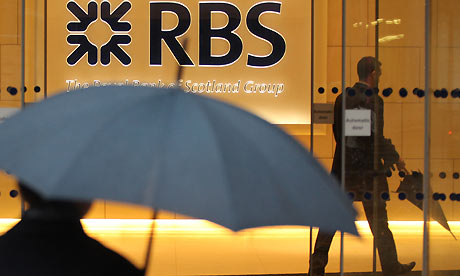• HSBC bosses push for pay rises of up to 30%

RBS is expected to announce a bonus pool of £1.3bn next week Photograph: Shaun Curry/AFP/Getty Images
Loss-making Royal Bank of Scotland is braced for a row over City pay next week when it is expected to admit that its bonus pot for 22,000 investment bankers has reached £1.3bn – against last year's £1bn.
The Edinburgh-based bank is awaiting approval from UK Financial Investments, the body that looks after the taxpayer's 84% stake in the bank, for its proposed bonus pool. Chancellor Alistair Darling has yet to receive a formal presentation about the proposals, which he can veto. He has already said that bonuses cannot be paid in cash to anyone earning more than £39,000, which would affect most of the workforce in the investment bank.
RBS, which a year ago announced the biggest loss in British corporate history, is on Thursday expected to show that its losses have narrowed.
Lloyds Banking Group, in which the taxpayer has a 43% stake, reports on Friday and is also expected to report a heavy loss. Estimates for the deficit, which will be caused by impairment charges on loans granted by HBOS before it was rescued by Lloyds, range from £3bn to £11bn.
The heads of both banks are facing pressure to follow John Varley and Bob Diamond, the top two executives at Barclays, and refuse any bonuses this year. Under terms imposed by the Treasury neither RBS chief executive, Stephen Hester, nor his Lloyds counterpart, Eric Daniels, are permitted to take cash payouts, and any bonuses they receive must be paid in shares in three years' time.
City sources reckon the Barclays bosses' move is being scrutinised by the executive team at HSBC despite attempts by the bank to convince shareholders that they should be awarded pay rises – of up to 30% – this year.
Michael Geoghegan, the chief executive, and finance director Douglas Flint are thought to be among the executives that HSBC's remuneration committee believes should receive a rise.
Some major investors have told the remuneration committee that they do not believe pay rises on such a large scale are warranted and that the bank needs to reconsider its plans.
The Lloyds bonus pool may attract less controversy as the bank does not have an investment banking arm and largely needs to pay bonuses to its army of staff working in high street branches, where the average payout is £1,000. It is thought that its bonus pool is around £200m, considerably less than RBS's proposed amount.
Hester has already said the pressure from UKFI to restrict the way bonuses are paid has caused an exodus of staff.
It is thought that the proposal sent to UKFI would involve the bonuses being paid in shares worth £1.3bn, although some of the bank's debt may need to be used to make some of the payments, which are likely to be deferred over three years.
While the bank is prohibited from paying cash bonuses, the recipients of shares may be able to sell them shortly after receiving them – turning them into cash.
No comments:
Post a Comment